Federal President Ignazio Cassis makes the traditional first visit to Vienna. EU, Covid-19 and migration provide more topics of conversation than usual.
Ignazio Cassis visits his counterpart, Federal President Alexander Van der Bellen, in Vienna.
For decades, the new Swiss Federal President has been the first to visit Vienna. This symbolizes the close connection and friendship between the two neighbors, said Ignazio Cassis on Thursday at the press conference with Alexander Van der Bellen in the Secret Council Chamber of the Hofburg. Previously, he had paced the guard of honor in front of the oversized flags, held talks with his Austrian counterpart, and walked through imperial, white-and-gold doors; like its predecessor a year ago and its predecessor in 2020 – Simonetta Sommaruga back then simply without an FFP2 mask.
Not only the strict hygiene rules – journalists were only admitted with vaccination and test – reminded that the omicron wave is raging in both countries. The meeting with Federal Chancellor Karl Nehammer also had to be replaced by a telephone conversation at short notice, as he is in isolation after a Covid 19 infection. There was, however, a greater need for talks than on previous visits, with Van der Bellen and EU Minister Karoline Edtstadler.
no island
Even if Austria’s weight at EU level is limited and Vienna puts its own interests first: Bern knows that its neighbor has a lot of understanding for the trials and tribulations of federal European policy and acts as an advocate in Brussels. “We cannot afford to treat a country in the middle of Europe as an island,” Edtstadler told the NZZ after her conversation with Cassis. This conveyed to her that Switzerland felt less and less involved. “Austria can create a better atmosphere, especially if some of the procedures of the EU Commission are perceived as unfriendly.”
Austria rejects a policy of pin-pricks as a reaction to the unilateral termination of negotiations on a framework agreement by Switzerland. Nevertheless, Edtstadler makes it clear that she expects more willingness to compromise from Bern, and not from Brussels: the cohesion payments that have now been made are a positive signal, but a mechanism for dispute resolution and a change in practice in state aid are necessary. She rejects an unraveling of the five market access agreements, as they are apparently being discussed in the Federal Council: “We are in favor of a holistic solution.”

Austria’s Europe Minister Karoline Edtstadler.
At least Switzerland can count on active support from Vienna. Van der Bellen made it clear that he doesn’t think much of the new regulation, according to which researchers in Switzerland who have received ERC grants have to implement their projects at a foreign institution: “That’s bizarre, that can’t be a measure for the next years,” said the 77-year-old. The presidents named education, digitization and sustainability as focal points of the strategic partnership, to which both countries have contractually committed themselves in 2021. They also want to work more closely together on cyber defense and in the Western Balkans.
Migration issue
Since the Swiss Minister of Justice Karin Keller-Sutter is expected in Vienna at the beginning of February, the conflictual situation with migration has remained more of a side issue: For several months, Afghans have been traveling in increasing numbers from Austria to Switzerland by train. Authorities have recorded around 4,000 illegal border crossings since July. Since the mostly young men Both countries are mostly only used as transit countries on the way to France or Great Britain, the authorities can hardly keep them. Until the formalities are clarified, the refugees have traveled on.
In order to simplify them, Bern would like to discuss increased use with Vienna of a 2001 readmission agreement discuss, which also includes nationals of third countries. But the topic has in Austria, that 2021 with 34,000 asylum applications recorded the highest value since 2016, low priority. The government has indicated that it is willing to talk, but takes the justified position that most migrants entered the Schengen area elsewhere. They therefore fell under the Dublin rules – and the responsibility of the countries of first arrival. Concessions are hardly to be expected here, despite all the friendship.
